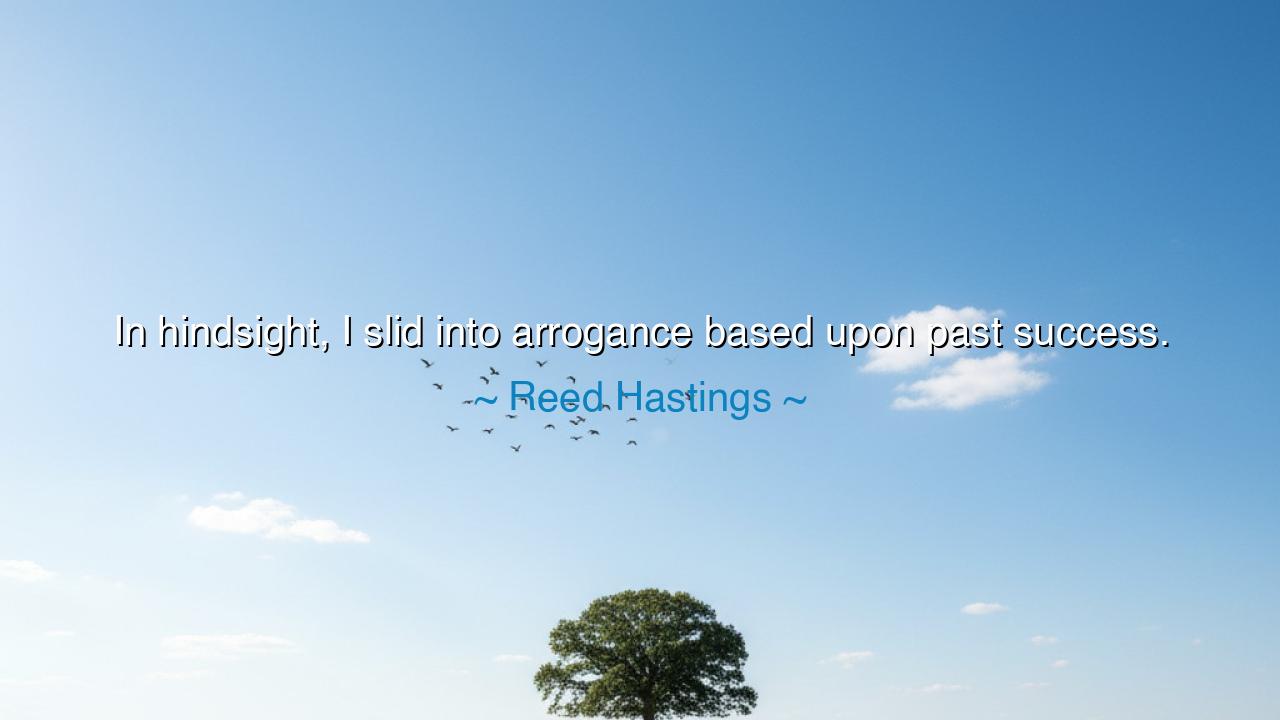
In hindsight, I slid into arrogance based upon past success.






When Reed Hastings confessed, “In hindsight, I slid into arrogance based upon past success,” he spoke not merely of his own journey, but of a universal truth that has ensnared kings, warriors, and visionaries alike. For success, though glorious, is a double-edged sword: it lifts men into the light, yet tempts them to believe they are beyond error, beyond the wheel of fate. Arrogance creeps quietly, like ivy upon a wall, until it suffocates the very foundation that once supported triumph. Hastings’ words, born of reflection, serve as a warning for all who taste victory—beware the intoxication of pride.
The ancients taught us this lesson time and again. The Greeks named it hubris, the fatal arrogance that invites the wrath of the gods. Think of Icarus, who, having soared on wings of wax and feather, forgot the frailty of his creation and rose too near the sun. In the heat of his triumph, he believed himself invincible, and so he fell into the sea. His story endures as a parable: success without humility leads not to glory, but to ruin. Hastings’ reflection is a modern echo of this ancient cry.
History too is filled with men whose past victories became the seeds of their downfall. Consider Napoleon Bonaparte, who rose from obscurity to become master of Europe. His brilliance in battle was unmatched, and for a time, he seemed destined to shape the world itself. Yet it was his reliance upon past success, his belief in his own unbreakable destiny, that led him into the snows of Russia and the fires of Waterloo. What once was genius turned to overconfidence; what once was vision turned to arrogance. Thus the mighty emperor fell, not at the hands of his enemies alone, but by the weight of his own pride.
Yet Hastings, unlike Icarus or Napoleon, speaks with the wisdom of hindsight. To see one’s arrogance after the fall is not shameful—it is the beginning of wisdom. For only the fool denies his errors; the wise confess them, learn from them, and offer their story as guidance to others. In this act, Hastings turns his stumble into teaching, transforming his arrogance into a beacon for those who would follow.
The lesson for us is this: never let past success blind you to present reality. The victories of yesterday are but shadows; they cannot guarantee tomorrow. Each day demands humility, fresh effort, and open eyes. When fortune lifts you high, remember the ground from which you came. When applause surrounds you, remember silence. When pride tempts you to believe you cannot fall, recall the fate of Icarus, of Napoleon, and of all who forgot the limits of man.
Practical wisdom follows. After each success, pause and reflect: was this victory the fruit of your labor alone, or also of timing, allies, and fortune? Give thanks to those who helped you rise, and honor the forces beyond your control. Keep learning, even when you feel you have mastered the game. Surround yourself with voices that question you, not only those that praise you. And above all, practice humility, for it is the armor against arrogance.
Therefore, let us hold Hastings’ words as a mirror. We too may one day taste the bitterness of pride after success, but if we remember his warning, we may turn our hindsight into foresight. Let us rise not as Icarus, scorched by the sun, but as the wise who soar steadily, wings strengthened by humility. For the true measure of greatness is not in how high one climbs, but in how steadfastly one walks when fortune has already crowned them. Success without humility is a fleeting blaze; success with humility is a light that endures.






AAdministratorAdministrator
Welcome, honored guests. Please leave a comment, we will respond soon